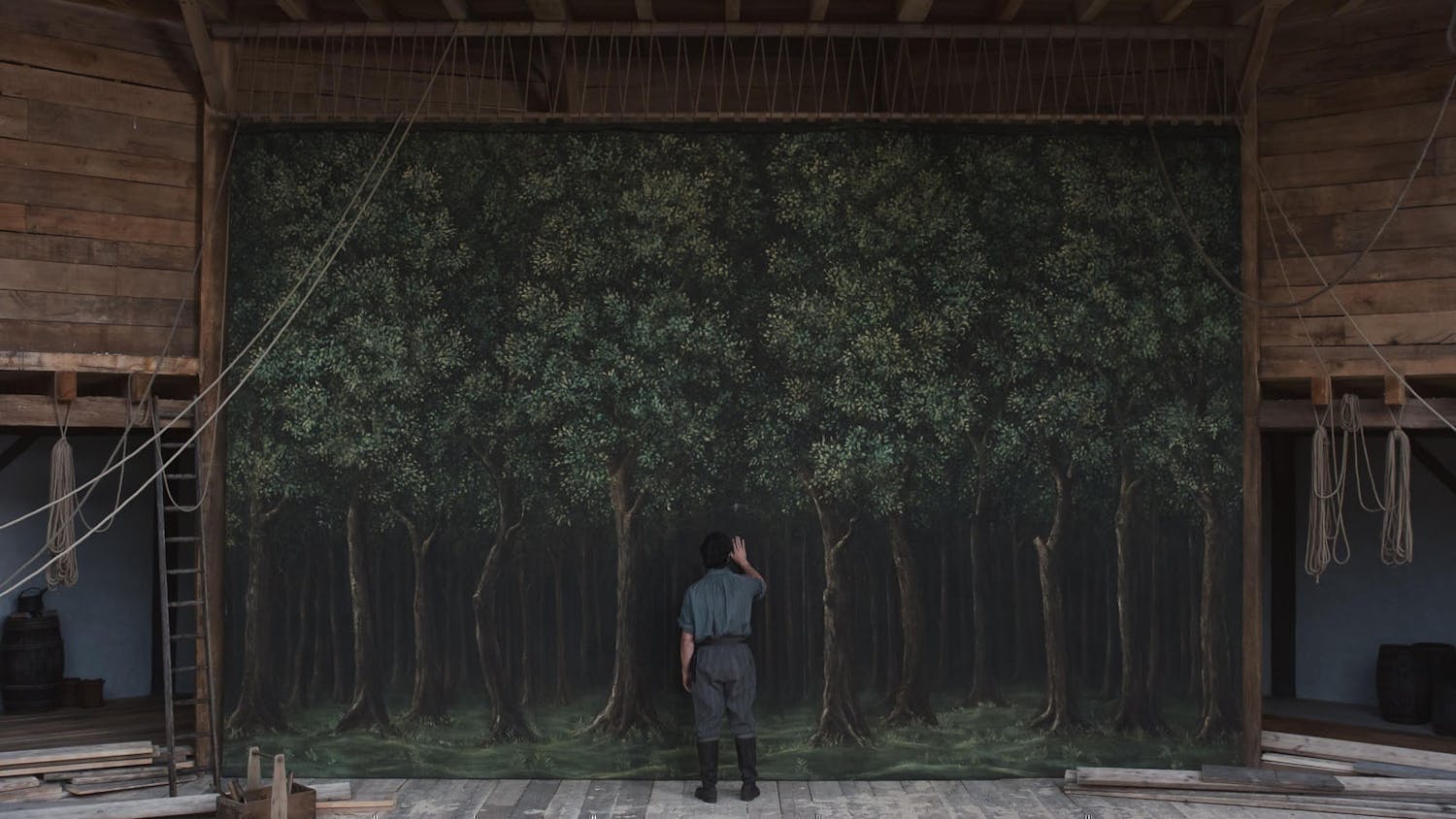From the Newsstands: This story appeared in our December 2021 print edition. You can find the digital version here.
In January, American University announced Wesley Bush as one of its newest trustees, a decision that drew backlash from the community and brought attention to the impact that trustee appointments have on students.
Bush’s appointment was the subject of a letter-writing campaign and campus graffiti denouncing his former position as the chairman and CEO of Northrop Grumman, one of the world’s largest defense weapons manufacturers.
The controversy surrounding Bush’s appointment shined a spotlight on a part of AU’s leadership that typically receives little public attention, despite the integral role it plays in the University’s strategic plan and decision making. The board is grounded in long-term developments aimed at expanding AU’s growth and influence despite any temporary changes it may face in the meantime.
The board of trustees consists of 26 members, whose professional titles include CEO, U.S. representative and philanthropist. Many trustees have corporate interests beyond their work at AU, while others direct massive sums of money towards political candidates. Trustees must balance these interests with the best interests of the University, making their decisions more complex.
Trustee Money
Each trustee is required to donate at least $25,000 to the University every year, but several have donated millions in the name of residence halls, political centers and athletic programs. Most of their political donation history is relatively bipartisan, with many trustees donating to Democratic and Republican candidates, often in the same election cycle. In 2019, board member Jeffrey Sine donated exclusively to Republican campaigns, but in 2020 he donated to two Democrats: Joe Manchin and Kyrsten Sinema.
Another example is U.S. Rep. David Trone (D-MD), who sits on a number of boards including that of Furman University, and frequently donates to political campaigns across the country. The majority of Trone’s donations go to Democratic campaigns. From January 2019 through August 2020 Trone donated $1,425,400 to political campaigns.
Several other trustees, including Gina Adams and Gaurdie Bannister Jr., carry ties to large corporations. Adams, for example, serves as the FedEx corporation’s top lobbyist and runs the FedEx Corporation Political Action Committee, a PAC that in the 2018 election cycle donated about 67 percent — $683,735 — of its money to Republican candidates. Bannister, meanwhile, is a board member of a material science company Dow and the former CEO of Area Energy LLC., an oil and gas company.
Despite these competing political and corporate commitments, the trustees work together to make decisions that best serve the University community, current trustee and former board chair Sine said.
Sine is the founder of The Raine Group LLC., a member of the board of trustees for NPR and a proud AU alumni. He has contributed donations to candidates and groups from both sides of the political aisle, including a $200,000 donation to super PAC “Socially Liberal Fiscally Conservative” in 2016.
Representing AU: Bush’s appointment faces student backlash
Bush’s controversial past has been called out by the student body since his appointment to the board.
The School of International Service’s motto is “Waging Peace,” and Bush’s presence on the board is a contradiction for many students as a former chairman of one of the world’s largest weapons manufacturers and military technology providers. In June, graffiti on AU’s campus read, “FIRE WES BUSH AU is murder complicit.” Activists, led by AU Dissenters, have also sent nearly 300 letters to the University pushing for Bush’s removal.
Bush emphasized that he believes in freedom of expression. He said students protesting his presence on the board have only reinforced his convictions.
“One of the great things about AU, and I would say any qualified higher education institution, is to have an arena with the ability for students and for faculty and others to speak freely and put their ideas forward,” Bush said. “But at the end of the day, I think it’s important for those views to be represented across the spectrum. And one of the components of that is then folks who work in national security.”
Bush maintained that the diversity of the board and its commitment to engaging with students in order to best represent their interests is what makes it effective. Bush said he is enthusiastic about increasing student engagement with the board through forums and hopes to speak to students one-on-one once the board’s in-person operations resume.
“It’s the job of a trustee to represent the students and to represent the whole institution. And I take that job seriously … hearing their point of view is important as well,” Bush said.
Decision Making
Trustees follow a fiduciary model for managing the endowment, which means they handle the endowment to maximize long-term profit. They act on the behalf of AU and follow the legal guidelines that aim to protect the University from mismanagement of funds.
The endowment serves as AU’s primary source of economic stability and funds everything from student scholarships to faculty and staff pay.
The board’s priority is the students, faculty and staff, according to Board Chair Marc Duber. Duber says that the school is on two paths: one of management, focusing on day to day issues, and one of the board, which is responsible for “the long term success of the University.”
Sine said when it comes to making decisions, the board always tries to reach an agreement.
“I cannot think of many votes where it hasn’t been either close to or completely unanimous … if there’s differences of opinion, it’s our job to talk them out, talk them through, figure out what the issues are,” Sine said. “Usually we’re able to kind of end up in a place where people are able to support things.”
Sine also said the board makes its decisions with student input.
“We also have [a] student representative on the finance committee and we have had that for, I don’t know, quite a few years already,” he said. “We also have [a] faculty representative on the finance committee. So we have student voice[s] represented on that ... there were quite a few years when there was a very active student campaign to divest fossil fuels.”
Student trustee Anusha Mannam trained as a student trustee elect for the previous academic year and now attends each of the trustee board meetings as a nonvoting participant tasked with providing a student perspective. She attends each of the committee meetings, ranging from the finance committee to the diversity, equity, and inclusion committee, which occur in the week leading up to the main board meeting.
Mannam said the trustees value her student perspective during meetings.
“There will be times where we’re sitting in a meeting, and a trustee is like, ‘Hey Anusha what do you think about this? What do the students feel about this? Are there any issues with this?’ And with that, it’s not just us being there as placeholders, it’s us being there for an actual purpose. They want our opinions,” she said.
Student trustee-elect Aisha Jallow has been shadowing Mannam since she was chosen for the role in September and is hoping to bring issues to light that are important to her and other students to the board.
“Right now I’m playing a more observational role. I’m pretty involved in campus [life], I’ve been talking to other students about any concerns they have ... I meet a lot of people on a daily basis,” Jallow said.
Jallow said she hopes to talk to the board about COVID-19 policies, especially how students can stay up to date in their classes after testing positive, as this is a top priority for students. Jallow also wants to prioritize food insecurity on campus in her discussions with the board.
For Mannam, the diverse makeup of the board is held together by a shared passion for AU and the promise it holds for students and alumni alike. Members range from double eagles — alumni who hold multiple degrees from the University — to parents, current professors and religious leaders.
As a member of the diversity, equity and inclusion committee, Sine emphasized AU’s role within the current cultural reckoning with racism at AU and college campuses across the country.
“I think these moments — and this goes back to George Floyd, Black Lives Matter — but I think these moments call for institutions like AU to kind of be more visible about their commitments, and to create more accountability about those commitments,” Sine said.
AU’s board is more diverse than the national average, according to a 2020 McKinsey survey that found the average collegiate board is 70 percent male and nearly 75 percent white. At AU, there are 11 female board members and 21 male board members, and nine identify as people of color.
However, the demographics of the board starkly contrast with the demographics of the University. While the board is 72 percent white and 65 percent male, the University is 50 percent white and 61 percent female, according to 2017 data from AU’s Office of Institutional Research and Assessment. While the board of trustees is more diverse than the national average, it is by no means representative of the student body.
“We look at the makeup of the board, we try and make sure we have a diverse group of trustees, and always try to fill any voids we see,” Duber said. “For example, when the board went through a study many years ago … it was brought up that we should have trustees from the education space, the higher ed space, so we had two former university presidents on the board.”
In looking at long term issues, trustees remain optimistic about the opportunities they have to help AU thrive in the future.
“We’re all here for one purpose, we’re here to better the University and with that, in order to best serve the interests of the AU community, we need those different perspectives,” Mannam said.
Spencer Nusbaum contributed to the reporting of this story.
rgillis@theeagleonline.com and apritchard@theeagleonline.com





